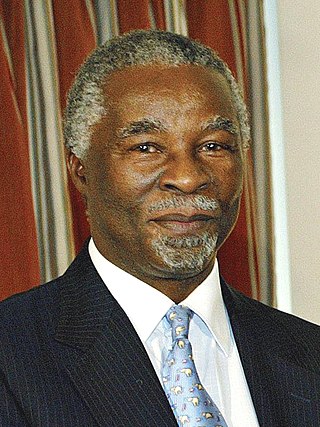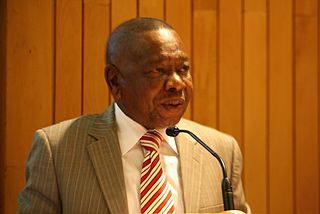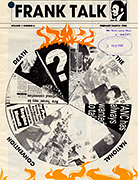
Thabo Mvuyelwa Mbeki is a South African politician who served as the 2nd democratic president of South Africa from 14 June 1999 to 24 September 2008,when he resigned at the request of his party,the African National Congress (ANC). Before that,he was deputy president under Nelson Mandela from 1994 to 1999.
The Black People's Convention (BPC) was a national coordinating body for the Black Consciousness movement of South Africa. Envisaged as a broad-based counterpart to the South African Students' Organisation,the BPC was active in organising resistance to apartheid from its establishment in 1972 until it was banned in late 1977.

The Azanian People's Organisation (AZAPO) is a South African liberation movement and political party. The organisation's two student wings are the Azanian Students' Movement (AZASM) for high school learners and the Azanian Students' Convention (AZASCO) for university level students. The organisation's women's wing is Imbeleko Women's Organisation,simply known as IMBELEKO. Its inspiration is drawn from the Black Consciousness Movement inspired philosophy of Black Consciousness developed by Steve Biko,Harry Nengwekhulu,Abram Onkgopotse Tiro,Vuyelwa Mashalaba and others,as well as Marxist Scientific Socialism.

The Socialist Party of Azania (SOPA) was a political party in South Africa adhering to Black Consciousness theory. In the 2004 general elections,it received 0.1% of the vote and no legislatorial seats at either the national or provincial levels.

The Cabinet of South Africa is the most senior level of the executive branch of the Government of South Africa. It is made up of the president,the deputy president,and the ministers.

The Black Consciousness Movement (BCM) was a grassroots anti-apartheid activist movement that emerged in South Africa in the mid-1960s out of the political vacuum created by the jailing and banning of the African National Congress and Pan Africanist Congress leadership after the Sharpeville Massacre in 1960. The BCM represented a social movement for political consciousness.
[Black Consciousness'] origins were deeply rooted in Christianity. In 1966,the Anglican Church under the incumbent,Archbishop Robert Selby Taylor,convened a meeting which later on led to the foundation of the University Christian Movement (UCM). This was to become the vehicle for Black Consciousness.
The South African Students' Organisation (SASO) was a body of black South African university students who resisted apartheid through non-violent political action. The organisation was formed in 1969 under the leadership of Steve Biko and Barney Pityana and made vital contributions to the ideology and political leadership of the Black Consciousness Movement. It was banned by the South African government in October 1977,as part of the repressive state response to the Soweto uprising.

Mosiuoa Gerard Patrick Lekota is a South African anti-Apartheid revolutionary for the African National Congress (ANC) who served jail time with Nelson Mandela from 1985 and who left the ANC to form the Congress of the People (Cope) splinter party in 2008. He has served as its President since 16 December 2008.

Brigitte Sylvia Mabandla is a South African politician,lawyer and former anti-apartheid activist who served in the cabinet of South Africa from 2003 to 2009,including as the Minister of Justice and Constitutional Development from 2004 to 2008. She became the South African Ambassador to Sweden in January 2020. A veteran of the African National Congress (ANC),she was an elected member of party's National Executive Committee between 1997 and 2012.

Frank Chikane is a South African civil servant,writer and cleric. He is a member of the African National Congress and moderator of the Commission of the Churches on International Affairs for the World Council of Churches (WCC).

Wetshotsile Joseph Seremane is a former South African politician and federal chairperson of the country's main opposition party,the Democratic Alliance (DA).

Bonginkosi Emmanuel "Blade" Nzimande is a South African politician,sociologist,philosopher,educator,anti-apartheid activist and Minister of Higher Education,Science and Technology. He was Minister of Transport from 2018 to 2019,and Minister for Higher Education and Training from 2009 to 2017. He was the General Secretary of the South African Communist Party from 1998 up until 2022.
The following lists events that happened during 2008 in South Africa.

Internal resistance to apartheid in South Africa originated from several independent sectors of South African society and took forms ranging from social movements and passive resistance to guerrilla warfare. Mass action against the ruling National Party (NP) government,coupled with South Africa's growing international isolation and economic sanctions,were instrumental in leading to negotiations to end apartheid,which began formally in 1990 and ended with South Africa's first multiracial elections under a universal franchise in 1994.

Frank Talk was a political magazine established in 1984 in South Africa,and arising out of the student-led anti-apartheid movement of the 1970s and 80s.
Steve Vukhile Tshwete was a South African politician and activist with the African National Congress. Involved in Umkhonto we Sizwe,Tshwete was imprisoned by the apartheid authorities on Robben Island from February 1964 to 1978. Tshwete resumed activities with the ANC and become a regional coordinator for the new United Democratic Front. He later lived in exile in Zambia with the ANC. After the first free elections in South Africa in 1994,he became the new government's first Sports Minister and later was Minister of Safety and Security.
Winnie Motlalepula Kgware was a South African anti-Apartheid activist within the Black Consciousness Movement (BCM). She was elected as the first president of the Black People's Convention (BPC),a BCM-affiliated community-based organisation in 1972.
Pandelani Jeremia Nefolovhodwe is a South African politician and former anti-apartheid activist who served as deputy president of the Azanian People's Organisation (AZAPO) from 1992 to 2010. He represented the party in the National Assembly from 2002 to 2009 and was formerly its president from 1990 to 1992.
Thomas Madikwe Manthata was a South African activist who was active in the anti-apartheid movement. After the end of apartheid,he served as a member both of the Truth and Reconciliation Commission and of the South African Human Rights Commission.
Daniel Ntjammu Habedi is a South African politician and former anti-apartheid activist. He is a former secretary-general of the Azanian People's Organisation and represented the party in the National Assembly from April to June 2004;his tenure was cut short by the Electoral Court's finding that the seat had been allocated to the wrong party.












